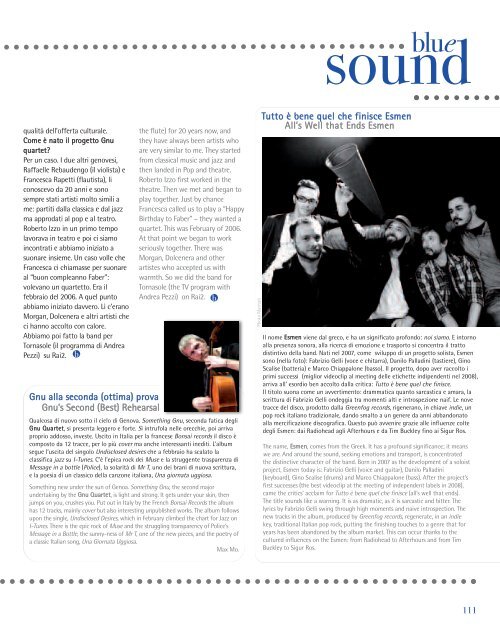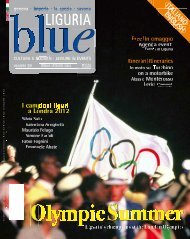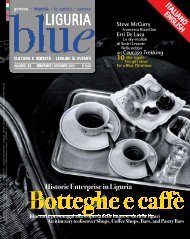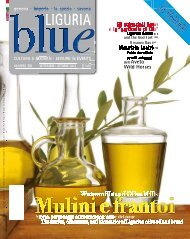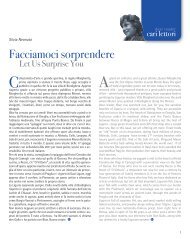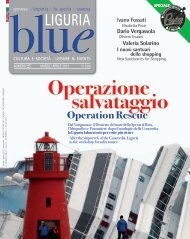You also want an ePaper? Increase the reach of your titles
YUMPU automatically turns print PDFs into web optimized ePapers that Google loves.
qualità dell’offerta culturale.<br />
Come è nato il progetto Gnu<br />
quartet?<br />
Per un caso. I due altri genovesi,<br />
Raffaelle Rebaudengo (il violista) e<br />
Francesca Rapetti (flautista), li<br />
conoscevo da 20 anni e sono<br />
sempre stati artisti molto simili a<br />
me: partiti dalla classica e dal jazz<br />
ma approdati al pop e al teatro.<br />
Roberto Izzo in un primo tempo<br />
lavorava in teatro e poi ci siamo<br />
incontrati e abbiamo iniziato a<br />
suonare insieme. Un caso volle che<br />
Francesca ci chiamasse per suonare<br />
al “buon compleanno Faber”:<br />
volevano un quartetto. Era il<br />
febbraio del 2006. A quel punto<br />
abbiamo iniziato davvero. Lì c’erano<br />
Morgan, Dolcenera e altri artisti che<br />
ci hanno accolto con calore.<br />
Abbiamo poi fatto la band per<br />
Tornasole (il programma di Andrea<br />
Pezzi) su Rai2.<br />
Gnu alla seconda (ottima) prova<br />
Gnu’s Second (Best) Rehearsal<br />
the flute) for 20 years now, and<br />
they have always been artists who<br />
are very similar to me. They started<br />
from classical music and jazz and<br />
then landed in Pop and theatre.<br />
Roberto Izzo first worked in the<br />
theatre. Then we met and began to<br />
play together. Just by chance<br />
Francesca called us to play a “Happy<br />
Birthday to Faber” – they wanted a<br />
quartet. This was February of 2006.<br />
At that point we began to work<br />
seriously together. There was<br />
Morgan, Dolcenera and other<br />
artistes who accepted us with<br />
warmth. So we did the band for<br />
Tornasole (the TV program with<br />
Andrea Pezzi) on Rai2.<br />
Qualcosa di nuovo sotto il cielo di Genova. Something Gnu, seconda fatica degli<br />
Gnu Quartet, si presenta leggero e forte. Si intrufola nelle orecchie, poi arriva<br />
proprio addosso, investe. Uscito in Italia per la francese Bonsai records il disco è<br />
composto da 12 tracce, per lo più <strong>cover</strong> ma anche interessanti inediti. L’album<br />
segue l’uscita del singolo Undisclosed desires che a febbraio ha scalato la<br />
classifica jazz su I-Tunes. C’è l’epica rock dei Muse e la struggente trasparenza di<br />
Message in a bottle (Police), la solarità di Mr T, uno dei brani di nuova scrittura,<br />
e la poesia di un classico della canzone italiana, Una giornata uggiosa.<br />
Something new under the sun of Genoa. Something Gnu, the second major<br />
undertaking by the Gnu Quartet, is light and strong. It gets under your skin, then<br />
jumps on you, crushes you. Put out in Italy by the French Bonsai Records the album<br />
has 12 tracks, mainly <strong>cover</strong> but also interesting unpublished works. The album follows<br />
upon the single, Undisclosed Desires, which in February climbed the chart for Jazz on<br />
I-Tunes. There is the epic rock of Muse and the struggling transparency of Police’s<br />
Message in a Bottle, the sunny-ness of Mr T, one of the new pieces, and the poetry of<br />
a classic Italian song, Una Giornata Uggiosa.<br />
Max Mo.<br />
Photo Maritati<br />
sound<br />
blue<br />
Tutto è bene quel che finisce Esmen<br />
All’s Well that Ends Esmen<br />
Il nome Esmen viene dal greco, e ha un significato profondo: noi siamo. E intorno<br />
alla presenza sonora, alla ricerca di emozione e trasporto si concentra il tratto<br />
distintivo della band. Nati nel 2007, come sviluppo di un progetto solista, Esmen<br />
sono (nella foto): Fabrizio Gelli (voce e chitarra), Danilo Palladini (tastiere), Gino<br />
Scalise (batteria) e Marco Chiappalone (basso). Il progetto, dopo aver raccolto i<br />
primi successi (miglior videoclip al meeting delle etichette indipendenti nel 2008),<br />
arriva all’ esordio ben accolto dalla critica: Tutto è bene quel che finisce.<br />
Il titolo suona come un avvertimento: drammatica quanto sarcastica e amara, la<br />
scrittura di Fabrizio Gelli ondeggia tra momenti alti e introspezione naif. Le nove<br />
tracce del disco, prodotto dalla Greenfog records, rigenerano, in chiave indie, un<br />
pop rock italiano tradizionale, dando smalto a un genere da anni abbandonato<br />
alla mercificazione discografica. Questo può avvenire grazie alle influenze colte<br />
degli Esmen: dai Radiohead agli Afterhours e da Tim Buckley fino ai Sigur Ros.<br />
The name, Esmen, comes from the Greek. It has a profound significance; it means<br />
we are. And around the sound, seeking emotions and transport, is concentrated<br />
the distinctive character of the band. Born in 2007 as the development of a soloist<br />
project, Esmen today is: Fabrizio Gelli (voice and guitar), Danilo Palladini<br />
(keyboard), Gino Scalise (drums) and Marco Chiappalone (bass). After the project’s<br />
first successes (the best videoclip at the meeting of independent labels in 2008),<br />
came the critics’ acclaim for Tutto è bene quel che finisce (all’s well that ends).<br />
The title sounds like a warning. It is as dramatic, as it is sarcastic and bitter. The<br />
lyrics by Fabrizio Gelli swing through high moments and naive introspection. The<br />
new tracks in the album, produced by Greenfog records, regenerate, in an indie<br />
key, traditional Italian pop rock, putting the finishing touches to a genre that for<br />
years has been abandoned by the album market. This can occur thanks to the<br />
cultured influences on the Esmen: from Radiohead to Afterhours and from Tim<br />
Buckley to Sigur Ros.<br />
111


